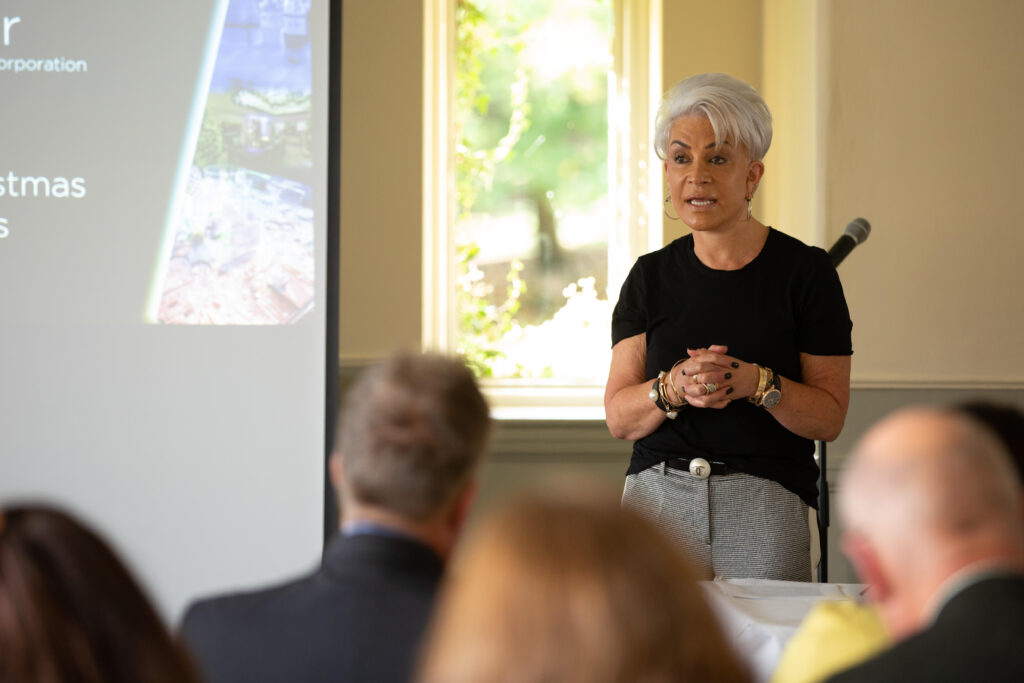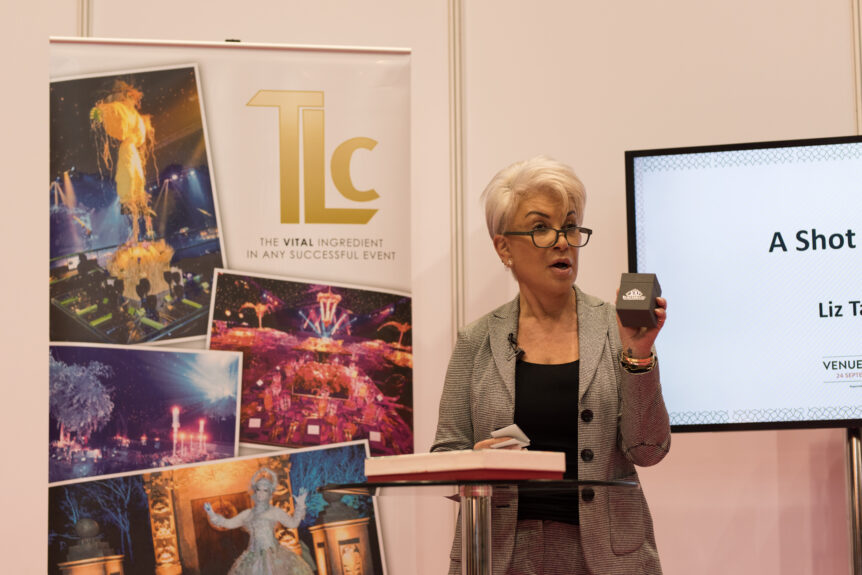None of us can ignore AI. It has permeated our lives more quickly than we could have ever imagined, used in everything from blog writing to social media, event planning, and personal tasks, such as researching holidays or restaurants to visit. Love it or hate it, it is part of our daily lives. A reluctant adopter, I might be, but also excited. Here lies opportunity and concern in equal measure. My main concern is not some Terminator-esque ‘end of days’ plot but more a loss of creativity and originality. Yes, we utilise it within the business, but there are certain areas where I worry that AI could have a negative impact. Speech writing, for example. Which is why I want to explore how AI can affect public speaking.

My style of motivational public speaking is deeply personal. My style, persona, and charisma – are all unique to me as a speaker. I, myself, and countless others have built successful careers by having a public speaking point of difference. As more speech writers and speakers use AI to guide their content, will this personality disappear? Will our uniqueness fade?
Time for a little experiment.
HOW AI CAN AFFECT PUBLIC SPEAKING
I asked an AI assistant to write a speech for me, using some of my previous speeches as a style guide. The point? To see if it could adapt to my style and sound like me. More ‘Liz’ than I am myself, perhaps. Here are the results.
The topic. How venues can break into the luxury sector. I gave it some of my previous speeches to mimic my style. After a few misfires and misunderstandings (potentially user error), this is the introduction it bestowed upon me.
BREAKING INTO THE LUXURY SECTOR: MY JOURNEY
Good morning! I am absolutely delighted to be here, sharing my journey with a room full of talented, entrepreneurial businesswomen. And I can already hear some of you thinking: What can a party planner possibly say that will keep me awake for the next 20 minutes?
Well—fasten your seatbelts, because my journey has been in a fast car, at top speed, with more than a few road bumps along the way. So, here goes…
INTO FIRST GEAR
My day starts early—exercise is first on the agenda. It clears my head of all the insecurities I wake up with, and after an unfortunate treadmill incident last year (don’t ask), I now cycle away to Gloria Gaynor. Music is in my blood—I learned the piano at four, and it influences everything I do. It fuels my creativity, my passion, and yes—some of my crazier ideas.
Post-workout, I squeeze a grapefruit, sip hot water with lemon, and down fifteen vitamins in my never-ending quest for eternal youth. I then debate whether today’s diet will be cabbage soup, keto, or Slimming World before heading to HQ, making a dozen urgent calls en route.
My PA greets me with a Café Nero—two shots, skimmed milk—and I spend thirty minutes filtering through the mountain of emails from a host of anonymous insomniacs. I changed my team’s working hours after COVID, shifting from 9 AM to 10 AM, to allow everyone time for the gym before work. The difference in energy and mindset has been transformational. So, when the phones start ringing—all six lines—we’re good to go.
This is the pace I’ve lived for the last 40 years, and I firmly believe that commitment and enthusiasm in a competitive industry have been the keys to my success. Pair that with a brilliant team of creatives, and that’s how I’ve built both Taylor Lynn Corporation and Liz Taylor Consulting—a leading hospitality consultancy.

WHAT’S THE VERDICT?
Does it sound like me? In places. I’m not entirely convinced. I’m definitely not renowned for my insecurities. The racing analogy leaves me a little cold. It’s clumsy in parts and a little cheesy, but I have to admit, and this was just a few minutes of playing around with AI; there are moments in the speech that have me taken. I think that given a little training and more data to confirm my style and persona, we could write a half-decent speech, AI and I.
There’s a but. What AI can’t do is live my experiences and recall the anecdotes that have been collected over a thirty-year career. Yes, I could take the time to input these, but let’s face it, by the time I’ve recounted even half of my stories, I may as well have written the speech myself.
Another thought. If we mindlessly ask AI to generate public speeches, we don’t learn them as well. We don’t live the content, and there’s a chance we may not completely believe in it. Questions at the end may result in a completely different speaker style. Would that section be more engaging? More authentic? Or would some speakers appear unprepared and lacking in expertise when put on the spot? In short, could AI make us lazy?
HOW AI WILL TRANSFORM PUBLIC SPEAKING
So, how can AI affect public speaking? Well funnily enough I asked ChatGPT that very same question and the summary is below.
Public speaking has long been a skill reserved for the naturally gifted or rigorously trained. But with the rise of artificial intelligence (AI), the game is changing. From real-time speech coaching to audience analysis, AI is reshaping how we prepare, deliver, and refine speeches. Whether you’re a keynote speaker, an entrepreneur pitching investors, or someone terrified of speaking in front of a crowd, AI is about to make your life a whole lot easier.
- AI-Powered Speech Coaching
Not everyone has access to a professional speech coach, but AI is helping to bridge that gap. Tools like Yoodli and Orai analyse your speech patterns, tone, and pacing, offering real-time feedback on your delivery. They flag filler words, suggest vocal variations, and even assess body language (if paired with video analysis).
- Personalised Speechwriting with AI
Crafting a compelling speech takes time, but AI-powered writing assistants like ChatGPT and Jasper can generate outlines, refine language, and even adapt content for different audiences. With AI, speakers can create speeches that sound polished and professional while maintaining their unique voice.
- Real-Time Audience Feedback & Adaptation
Imagine delivering a speech while an AI system monitors audience reactions in real-time. AI can analyse facial expressions, engagement levels, and sentiment, offering immediate feedback on whether your audience is captivated or bored. Some advanced platforms could even suggest adjustments to mid-speech through smart earpieces or teleprompters.
- Breaking Language Barriers with AI Translators
With real-time AI translation and transcription tools like DeepL and Google’s AI-powered subtitles, public speaking is becoming more global. AI can translate speeches into multiple languages, enabling speakers to reach wider audiences without language being a barrier.
- Virtual Reality (VR) & AI for Public Speaking Practice
AI-powered VR simulations are revolutionising how people practice speeches. Platforms like VirtualSpeech create realistic audience environments, allowing speakers to rehearse in front of virtual crowds that react in real-time. This helps build confidence and reduce anxiety.
- AI-Powered Teleprompters & Presentation Aids
Traditional teleprompters are static, but AI-powered versions can adapt as you speak. AI-driven software can highlight key points, suggest alternative phrasing if you stumble, and adjust the pace based on audience engagement.
FINAL THOUGHTS – AI AS A PUBLIC SPEAKER PARTNER
I have to admit that a lot of this does sound attractive as a speechwriter and public speaker. Real-time feedback on how a speech is landing with an audience could be both useful and terrifying in equal measure. Translations and coaching – are both excellent ideas. And in summary of my little experiment, I do believe that AI can be a powerful aid to public speaking. But never a replacement.
In my opinion, speeches should still come from authentic human experiences and emotions. AI should be used to enhance your ability. It can provide tools to refine and elevate public speaking, as well as a framework for your speech to incorporate real, authentic moments.


